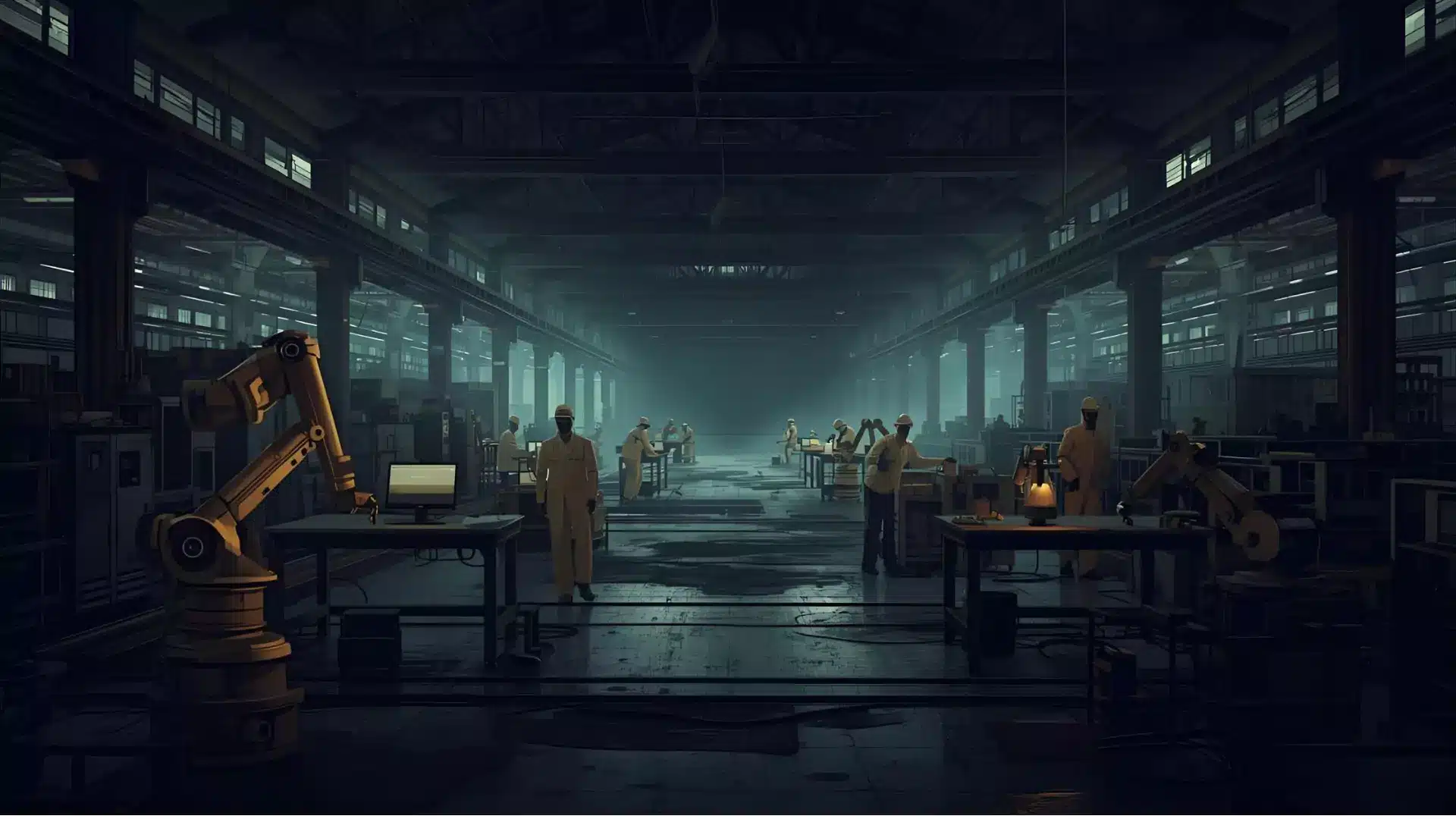How Unemployment and Automation Are Redefining the American Job Market: AI and automation are transforming the American workforce, phasing out some roles while creating new opportunities, especially in fields like AI development, robotics, and data science. According to a 2023 McKinsey report, around 60% of manufacturing tasks could potentially be automated, while a 2021 World Economic Forum report projected that automation could lead to the creation of 97 million new jobs globally by 2025. To thrive, workers need a blend of technical know-how and interpersonal abilities.
In this article, you will learn:
- A 2023 McKinsey report states that approximately 60% of manufacturing tasks have the potential to be automated.
- The World Economic Forum projected in 2021 that automation could create 97 million new jobs globally by 2025.
- Industries most impacted by automation include manufacturing, transportation, and data entry due to their heavy reliance on repetitive tasks.
- AI is being used to automate routine coding, identify bugs, and even generate scripts, speeding up the development process in the tech world.
- AI tools in recruitment can reduce hiring time by 21%, according to a 2019 study by the Society for Human Resource Management (SHRM).
- Skills like coding, data analysis, and AI programming are in high demand, alongside communication, collaboration, and creative thinking.
How are unemployment and automation redefining the American job market?
AI and automation are transforming the American workforce, phasing out some roles while creating new opportunities. This evolution is reshaping business functions and shifting the types of skills that are most valuable. To remain relevant, workers need to embrace change, continuously update their abilities, and commit to lifelong learning.
Positions that involve routine or repetitive duties are particularly vulnerable. As machines take over these functions, employees must remain adaptable and consider exploring new career directions. The effects are far-reaching, touching a wide range of professions and demanding a forward-thinking approach to personal growth and skill acquisition.
Industries most impacted by automation tend to be those heavily reliant on repetitive tasks, such as manufacturing, transportation, and data entry. According to a 2023 McKinsey report, around 60% of manufacturing tasks could potentially be automated. Similarly, transportation and warehousing are undergoing major shifts due to innovations like self-driving vehicles and automated logistics systems.
In the service sector, roles such as data entry clerks, customer service representatives, and telemarketers are increasingly being handled by AI tools like chatbots and virtual assistants. These technologies are managing more customer interactions, reducing the need for human involvement.
Office and administrative jobs are also evolving as AI handles responsibilities like scheduling, organizing data, and managing communications. In retail, tools such as self-checkout stations and automated inventory systems are decreasing the demand for cashiers and stockroom staff.
Automation isn’t just eliminating jobs; it’s also creating new ones, especially in fields like AI development, robotics, and data science. A 2021 World Economic Forum report projected that automation could lead to the creation of 97 million new jobs globally by 2025.
However, these new positions often require different skill sets. As machines take over routine work, there’s a growing need for individuals who can think critically, solve complex problems, and bring creativity to the table. Skills like emotional intelligence and sound decision-making are becoming increasingly valuable. Sectors such as renewable energy and data analytics are actively seeking professionals with specialized technical expertise.
To thrive in this changing landscape, workers need a blend of technical know-how and interpersonal abilities. Skills like coding, data analysis, and AI programming are in high demand, but so are communication, collaboration, and creative thinking. These human-centered skills are essential for tasks that require empathy, innovation, and nuanced judgment.
Preparing for these shifts means embracing continuous learning. Whether through online courses, certification programs, or hands-on training, staying current with new technologies is crucial. At the same time, developing soft skills like adaptability, critical thinking, and effective communication can help individuals navigate career transitions more smoothly. Networking and connecting with others in the field can also provide valuable insights and open up new opportunities.
Lifelong learning is no longer optional; it’s a necessity. Regularly evaluating your skill set and seeking ways to grow, whether through workshops, mentorships, or even career changes, is key to staying competitive. Flexibility and a willingness to evolve are essential in today’s fast-paced job market.
As automation handles more routine tasks, interpersonal and creative abilities are becoming increasingly prized. Skills like empathy, active listening, and clear communication are difficult for machines to replicate, making them more valuable than ever. Jobs that rely on emotional intelligence and human connection are less likely to be automated.
Creativity is also gaining ground as a sought-after trait. Employers are looking for people who can generate original ideas, design innovative solutions, and approach problems from fresh perspectives. As work becomes more strategic and complex, these uniquely human qualities are playing a bigger role in driving success.
AI is also changing how companies recruit talent. Many organizations now use AI tools to post job listings, review resumes, and evaluate candidates. These systems can quickly sift through large volumes of applications, identifying those who best match the job requirements. They also help streamline the hiring process and can reduce bias by focusing on qualifications rather than personal details.
For job seekers, AI can improve the application experience. Chatbots and virtual assistants can answer questions, schedule interviews, and provide real-time updates, making the process more efficient and user-friendly.
There are clear advantages to using AI in recruitment. It saves time, enhances efficiency, and can promote fairness by standardizing evaluations. AI can also help match candidates to roles that align with both their skills and the company’s culture.
However, there are potential downsides. AI systems can unintentionally reflect the biases present in their training data, leading to unfair or inconsistent outcomes. Another concern is the lack of transparency – it’s not always clear how these systems make decisions, which can be frustrating for both employers and applicants.
To use AI responsibly in hiring, companies need to balance its benefits with its risks. Implementing safeguards to ensure fairness, clarity, and accountability is essential for building trust and making the most of what AI has to offer in the recruitment process.
Which sectors are most affected by automation and AI?
Industries such as manufacturing, e-commerce, and data analysis are experiencing significant shifts as automation and artificial intelligence become more integrated into daily operations. In production facilities and distribution centers, AI-driven machines are increasingly taking over repetitive duties, leading to a transformation in traditional manufacturing roles.
E-commerce is also evolving, with automation now handling data collection and preliminary analysis. This shift reduces the need for manual labor in areas that once required human input. Professions like paralegals, insurance claims adjusters, and credit analysts are seeing a decline in demand as AI systems begin to perform many of their core functions.
AI’s capabilities extend far beyond basic tasks. In manufacturing, AI oversees intricate production workflows, enhances quality assurance, and optimizes efficiency. In the tech world, developers leverage AI to automate routine coding, identify and fix bugs, and even generate scripts, speeding up the development process.
The ripple effects are felt in other professional domains as well. Radiologists now rely on AI to interpret medical images with greater speed and accuracy, while accountants use it to support financial analysis and reporting. These advancements are not just changing individual jobs but are redefining how entire industries operate. The sectors most affected by automation and AI are those involving repetitive tasks, data processing, and complex analysis, leading to increased efficiency but also requiring workforce adaptation.
Is automation primarily eliminating jobs or creating new opportunities?
Automation is simultaneously eliminating jobs and creating new opportunities. Artificial intelligence is reshaping the workforce by phasing out some positions while giving rise to entirely new fields. As machines take over repetitive tasks, certain roles naturally fade away, but fresh opportunities are emerging in areas like AI programming, system oversight, and ethical governance.
AI has the potential to enhance the performance of high-achieving employees. Yet, it poses a greater risk to jobs that involve predictable, routine work—especially in entry-level roles where automation can easily take over. For example, data entry clerks and assembly line workers face a higher risk of displacement compared to roles requiring critical thinking and complex problem-solving.
While it’s unlikely that human workers will become obsolete, the paths people take in their careers are likely to evolve. As AI continues to advance, so does the demand for individuals who can steer its development responsibly and manage its broader effects. In that sense, AI isn’t just replacing jobs—it’s also creating meaningful new ones. This includes roles such as AI trainers, data scientists, and AI ethicists, all crucial for ensuring AI benefits society as a whole.
What skills are increasingly important in an automated job market?
As automation continues to transform the workforce, the demand for certain skills is shifting. While technical expertise remains important, there’s an increasing emphasis on human-centric abilities. As machines take over more repetitive tasks, people need to adapt by developing versatile, collaborative skills that allow them to work effectively alongside AI.
So, how can individuals prepare for the evolving skill landscape shaped by AI?
To stay competitive in a tech-driven world, it’s crucial to build capabilities that enhance, rather than compete with, technology. These include:
- analytical thinking: the ability to interpret data, think critically, and solve complex problems is more valuable than ever. This involves not just crunching numbers, but making informed decisions based on insights. For example, understanding market trends from sales data can drive strategic business decisions,
- AI and big data proficiency: a solid grasp of how artificial intelligence functions and how to handle large volumes of data gives professionals a significant edge. Familiarity with machine learning, data mining, and statistical analysis is especially beneficial. Professionals who can leverage AI tools to automate tasks and extract insights will be highly sought after,
- cybersecurity and networking know-how: as digital systems become more interconnected, safeguarding information is a top priority. Skills in network protection, threat identification, and data privacy are increasingly sought after. With the rise of remote work and cloud-based services, cybersecurity expertise is crucial for protecting sensitive data,
- digital fluency: comfort with modern tools and platforms is now a baseline expectation. Whether it’s navigating cloud-based services or using collaboration software, being tech-savvy is essential. This includes proficiency in using project management software, communication platforms, and data analysis tools,
- creative problem-solving: innovation remains a distinctly human trait. The ability to generate fresh ideas, approach challenges from new angles, and apply design thinking is highly prized. Companies need employees who can think outside the box and develop innovative solutions to complex problems,
- adaptability and resilience: the pace of change demands flexibility. Being able to pivot quickly, embrace new concepts, and bounce back from setbacks is key to long-term success. The ability to learn new skills and adapt to changing job requirements is essential in today’s rapidly evolving job market,
- curiosity and continuous learning: a genuine interest in learning and staying current with industry developments helps individuals remain relevant. Lifelong learning is no longer optional – it’s a necessity. This includes taking online courses, attending industry conferences, and reading relevant publications.
Are interpersonal and creative abilities becoming more important?
Definitely. These skills are increasingly valued because they’re difficult for AI to replicate. Emotional intelligence, effective communication, and nuanced problem-solving are essential in roles that rely on human connection and creativity.
Today’s workforce is expected to focus more on areas where machines fall short, such as:
- leading and supporting teams: guiding others, fostering collaboration, and creating a positive work environment. Effective leadership involves motivating team members, providing constructive feedback, and fostering a sense of shared purpose,
- applying specialized knowledge: tackling unique challenges with expertise and sound judgment. This requires a deep understanding of a particular field and the ability to apply that knowledge to solve complex problems,
- building relationships: engaging with others, articulating ideas clearly, and appreciating diverse perspectives. Strong interpersonal skills are essential for building trust, fostering collaboration, and resolving conflicts.
These abilities draw on emotional and social intelligence, as well as higher-level thinking like logic and imagination. While generative AI can imitate certain human behaviors, it also underscores the growing importance of qualities like empathy, persuasion, storytelling, and original thinking – traits that remain uniquely human.
How can individuals prepare for AI-driven changes in required skills?
As artificial intelligence continues to transform the workforce, staying ahead requires embracing new learning opportunities. Whether you’re shifting into a different career path or aiming to grow within your current role, focusing on reskilling, upskilling, and targeted training can make a significant difference. Reskilling involves acquiring a completely new set of abilities to transition into a different job, while upskilling sharpens the skills you already have to keep you competitive. Participating in structured training programs can also equip you with the specific expertise needed to thrive in today’s rapidly evolving job market.
To effectively prepare for the changes AI is bringing, consider these practical steps:
- Identify Skills Gaps, take a close look at your current skill set and compare it with the demands of future roles; for instance, as machine learning engineers develop new tools, the required skill sets across industries are shifting; understanding these gaps is the first step toward targeted improvement,
- Make Learning a Regular Habit, explore online courses, attend workshops, or earn certifications; many educational platforms now offer specialized programs in areas like AI, data science, and machine learning, making it easier than ever to stay up to date; consider platforms like Coursera, edX, and Udacity for structured learning paths,
- Expand Your Professional Circle, engage with people working in AI and tech-related fields; building relationships through networking and mentorship can keep you informed about emerging trends and the capabilities employers are prioritizing; attend industry conferences, join online forums, and connect with professionals on LinkedIn,
- Focus on Versatile Skills, abilities such as critical thinking, effective communication, and problem-solving are valuable across a wide range of roles; these foundational skills continue to matter, even as technology advances; develop these skills through practice, workshops, and seeking feedback from peers and mentors,
- Stay Open to Ongoing Growth, with AI evolving at a fast pace, maintaining a mindset of continuous learning is essential; regularly refreshing your knowledge ensures you remain adaptable and relevant; set aside time each week for learning and stay curious about new developments in the field.
By taking proactive steps like these, you’ll be better equipped to navigate the shifting job landscape and maintain a strong position in an AI-driven future.
Are interpersonal and creative skills becoming more valued?
Absolutely, interpersonal and creative abilities are becoming increasingly valuable.
As technology takes over repetitive tasks, there’s a growing demand for qualities only humans can offer. Machines may be efficient, but they can’t replace the nuance of human connection. Skills like clear communication, empathy, and innovative thinking are now more crucial than ever in navigating the evolving job market shaped by automation.
These traits not only help individuals stand out in an AI-driven world, but they also make certain roles more resilient to automation. Positions that depend on emotional intelligence and original thought, such as strategic planning, complex problem-solving, and leadership roles, are likely to remain in high demand, particularly among knowledge-based professions.
In a workforce that’s becoming more polarized, these distinctively human capabilities are proving to be key differentiators. Companies are increasingly prioritizing candidates who demonstrate strong interpersonal skills and creative problem-solving abilities, recognizing their importance in fostering collaboration, driving innovation, and adapting to rapidly changing market conditions.
How is AI influencing the recruitment and candidate selection process?
AI is reshaping how companies approach recruitment and candidate selection by automating routine tasks, increasing productivity, and promoting more equitable hiring practices. Its influence across human resources continues to grow, helping organizations attract and retain top talent more effectively.
One of the most significant advantages of AI in recruitment is speed. AI can rapidly sift through large volumes of applications, pinpointing candidates whose skills and experience align with job requirements. This early-stage filtering saves HR teams considerable time and ensures that promising applicants are identified sooner.
Beyond screening, AI leverages data to anticipate future hiring needs. By analyzing internal workforce metrics and broader market trends, it enables companies to plan strategically. It can also detect patterns related to employee turnover, offering valuable insights that help improve retention efforts. For example, AI might identify that employees in specific roles leave after a certain tenure, prompting the company to address potential issues like lack of growth opportunities or inadequate compensation.
Fairness is another significant benefit of AI in recruitment. By evaluating applicants based on predefined criteria, AI helps minimize unconscious bias, leading to more consistent and impartial hiring decisions. This ensures that candidates are assessed based on their qualifications rather than subjective factors.
AI’s role in recruitment brings several key improvements:
- Improved Efficiency: AI swiftly narrows down applicant pools to those who best fit the role, reducing the time recruiters spend on initial screening,
- Predictive Talent Planning: AI forecasts staffing needs by examining trends and internal data, enabling proactive recruitment strategies,
- Better Retention Strategies: AI uncovers reasons behind employee departures, allowing companies to respond proactively with targeted interventions,
- More Objective Hiring: Standardized evaluations help ensure fairer candidate assessments, promoting diversity and inclusion.
In addition to these core functions, AI enhances other stages of the hiring journey:
- Candidate Sourcing: AI scans various online platforms to discover potential hires, expanding the reach of recruitment efforts,
- Automated Communication: Chatbots and email tools keep applicants informed and engaged, improving the candidate experience,
- Skills Testing: Online assessments evaluate both technical abilities and soft skills, providing a more comprehensive view of candidate capabilities,
- Interview Coordination: Scheduling tools reduce the back-and-forth, saving time for both recruiters and candidates, streamlining the interview process.
Real-world examples highlight AI’s growing impact. Unilever, for instance, adopted AI to accelerate its hiring process and reduce expenses. Similarly, tech leaders like Google and Facebook use AI-driven tools to screen applicants and identify top performers efficiently. These examples demonstrate the tangible benefits of AI in transforming recruitment practices.
What are the pros and cons of using AI in recruitment?
AI is transforming business recruitment by offering faster hiring, smarter workforce planning, and more impartial evaluations. However, challenges remain, especially in fairness, data privacy, and implementation costs.
AI offers several key benefits in the hiring process:
- Faster Hiring: AI can rapidly sift through thousands of resumes, evaluate qualifications, and even coordinate interview schedules, significantly cutting down on time and easing the burden on HR teams. A 2019 study by the Society for Human Resource Management (SHRM) found that AI reduced hiring time by 21%,
- Smarter Talent Planning: By analyzing trends and workforce data, AI can anticipate future hiring needs, identify skill shortages, and even recommend potential candidates before roles become available, helping companies stay ahead in a competitive market,
- Higher Employee Retention: AI tools can examine employee feedback, performance metrics, and engagement levels to uncover patterns that often lead to turnover. With this insight, organizations can address issues early and retain top talent more effectively,
- Fairer Hiring Decisions: When properly designed, AI systems focus on qualifications and experience rather than personal characteristics, minimizing unconscious bias related to gender, ethnicity, or background, and promoting a more inclusive recruitment process.
Despite these advantages, there are also important drawbacks to consider:
- Potential for Bias: AI is only as fair as the data it’s trained on. If historical hiring data contains bias, the system may replicate those patterns. Addressing this issue requires thoughtful design and ongoing oversight. A 2018 report from the AI Now Institute highlighted how biased algorithms can worsen inequality in hiring,
- Reduced Human Interaction: While AI can streamline many tasks, it can’t fully replace the human touch. Understanding a candidate’s personality, values, and cultural fit often requires personal interaction. Over-reliance on automation may make the process feel impersonal, potentially discouraging strong applicants,
- Privacy Concerns: AI systems often gather and analyze large amounts of personal information, raising questions about data security and compliance with regulations like the GDPR. Companies must be transparent and careful in how they handle candidate data,
- High Implementation Costs: Deploying AI tools involves significant investment in technology and training. For smaller businesses, these expenses can be a major obstacle, making it harder for them to compete with larger firms that have more resources.
Ultimately, AI has the potential to make hiring more efficient, strategic, and equitable. However, it’s not without its challenges. To get the most out of these tools, companies must balance innovation with responsibility, ensuring their recruitment practices remain both effective and ethical.








